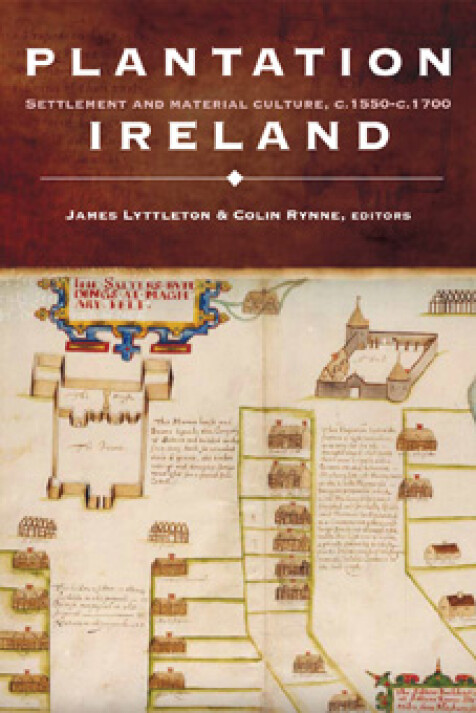Plantation Ireland
Settlement and material culture, c.1550–c.1700
James Lyttleton & Colin Rynne, editors
'The contributors are historians and archaeologists, each bringing his specialist knowledge to bear. They place the main plantation in the context of others in Ireland in this period and examine different aspects of plantation as a phenomenon in itself … it is an attractive book with illustration including colour reproductions of Bartlett’s maps of Ulster', Books Ireland (February 2010).
‘This wonderfully researched volume takes a fresh look at this major subject which is of particular interest to local historians and genealogists in Ireland … the editors and the essayists have provided the genealogist and the local or social historian with a remarkably refreshing opportunity to fundamentally reassess this ‘plantation-period’ Ireland and to bring forward new local studies accordingly … with an extensive bibliography this volume is an extremely important resource for the genealogist or local historian seeking to explore ‘plantation-period’ Ireland', Michael Merrigan, Ireland’s Genealogical Gazette (February 2010).
‘The thirteen essays written by historians, archaeologists and historical geographers illustrate the importance of interdisciplinary studies in providing a wider understanding and new insights into Ireland’s experience of plantation … One of the delightful features of this book is the excellent selection of the maps – many of which are reproduced for the first time – which are printed in colour … The editors and contributors to this volume are to be commended on having succeeded in providing a range of new and diverse perspectives with which to examine and assess the impact of plantation on the social, economic and cultural environment of Ireland. It is a stimulating addition to the existing body of literature relating to Ireland’s plantation experience', Jonathan Cherry, Studia Hibernica (2009/10).
‘This study of the plantations established from 1550–1700 grew out of a 2006 conference at Cork that drew from the disciplines of history, literature and archaeology … the work is tied together by examples of how a myriad of factors, plantations among them, were responsible for social, political and economic changes in Ireland as it moved from a clan-centered society to a capitalist one governed by a central authority', Reference & Research Book News (May 2010).
‘For those interested in a more in-depth study of various aspects of Ireland and its plantation culture, Plantation Ireland can be recommended', Brendan Scott, Breifne (2009/10).
‘Plantation Ireland contains a series of fourteen essays exploring the curious legacies that form significant milestones in Irish history. History, archaeology and architecture provide the perspectives', Tom Condit, Archaeology Ireland (Spring 2010).
‘Plantation Ireland is an important and well-produced collection that represents the present state of archaeological and historical research on the hundred-plus years between medieval Ireland and the Georgian Age … Well edited and designed, Plantation Ireland proves to be a valuable addition to scholarship, offering much of interest to a broad audience on such varied topics as architecture, archaeology, local history, literature, genealogy, economics, and religion. Readers are exposed to viewpoints, research techniques, and arguments that are new and often challenging, as they discover the complexities of this Irish Age of Transition', Eric Klingelhofer, H-Net (April 2011).
'This book exemplifies the positive results of ongoing collaborative research between archaeologists, geographers and historians … while giving due consideration to religious and cultural continuity, the book dispassionately defines plantation during the sixteenth and seventeenth centuries in terms of human mobility which has displaced indigenous populations throughout history … the fourteen chapters deal consistently with events from the time of Elizabeth I until the end of the reign of Charles I …the wealth of diagrams, photographs and maps, especially the colour plates, serve to enhance the text. The impression created by this book is that of an up-to-date satellite survey of the area under investigation, rather than chards of otherwise isolated geographical locations. It is recommended reading for the general reader and the specialist alike', Dr Benjamin Hazard, mappingdeath.ie (February 2011).

